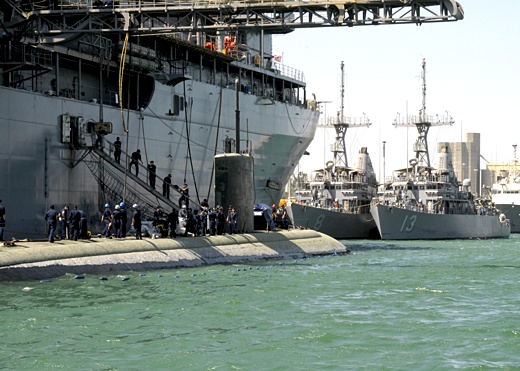 Image above: US Fifth Fleet conducts maintenance and support of submarines and surface vessels in its area of responsibility from Manama, Bahrain. From (http://www.cusnc.navy.mil/photos/2011/hi/110303-N-3686T-380.jpg).
Image above: US Fifth Fleet conducts maintenance and support of submarines and surface vessels in its area of responsibility from Manama, Bahrain. From (http://www.cusnc.navy.mil/photos/2011/hi/110303-N-3686T-380.jpg).
If Washington is uneasy about a Saudi-led foreign force of 1000 soldiers crossing the causeway from Saudi Arabia into Bahrain to take part in a crackdown, it is nonetheless keeping its criticism muted for two reasons.
Firstly, it would welcome an end to the turmoil in the island nation, home to the Fifth Fleet, and secondly, it knows that wagging its finger at Riyadh right now is unlikely to have much effect.
No Arab nation is more important to the United States than Saudi Arabia. It remains a bulwark against Iranian expansionism and a pivotal partner fighting global terrorism. Thus the statement from the White House stressed that the deployment of troops is "not an invasion" and included the mild admonition that they show "respect and restraint" on Bahraini soil.
Secretary of State Hillary Clinton said yesterday that force was not the answer. "We find what's happening in Bahrain alarming. We think that there is no security answer to the aspirations and demands of the demonstrators. They are on the wrong track."
In any event, anything stronger would not fly because not since the post-9/11 days - when it emerged that most of the hijackers had come from the kingdom - have Saudi-US relations been as testy as they are today.
It probably hasn't helped that in recent weeks the US has tightened the tone of its criticisms of Saudi Arabia by saying that to stave off trouble of its own, Saudi needs to pick up the pace of reforms it has allegedly been pursuing for several years.
Mostly, though, the Saudi leaders have yet to get over how the US handled last month's crisis in Egypt. As the protests intensified in Cairo, the Saudis implored President Barack Obama to stand by their ally, Hosni Mubarak. Egypt, after all, is hardly peripheral to US strategy in the Middle East. Obama cut Mubarak loose anyway.
Raising the temperature now is hardly what Washington wants. It is Saudi Arabia which in recent days has increased oil production to offset the loss of supplies from Libya, helping to avert a global energy shock. And in truth, the overlap of interests between the two countries remains significant as the turmoil in the Middle East persists.
Both want calm to return to Bahrain, neither wants an uprising to take shape in the kingdom and both want to limit Iran's influence in the region.
If Saudi Arabia deemed it necessary to send troops as part of a Gulf Co-operation Council force into Bahrain to protect the monarchy there and to fend off Iran from extending its influence on the peninsula, it was never going to ask permission from the US first. Never mind that its longer-term interests are keeping the US on side as its main supplier of arms and medical care to the ailing King Abdullah.
And that leaves Washington rehearsing all the usual bromides about restraint and respect. But this horse is already out of the stable - or across the causeway - and the US could do nothing about it even if it wanted to.
.
No comments :
Post a Comment